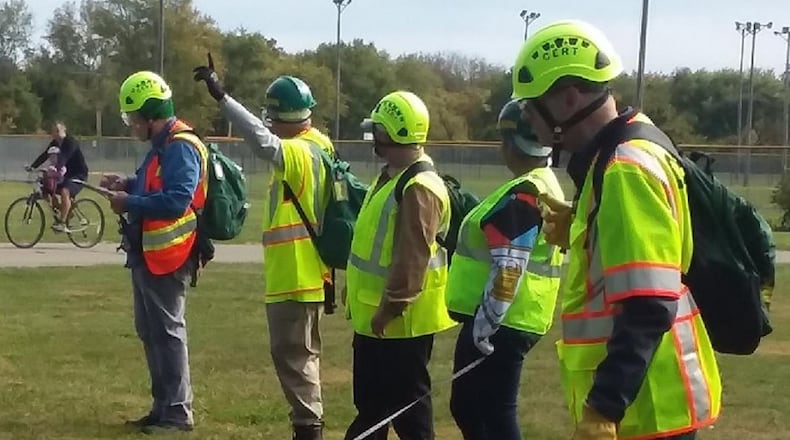And they are called.
“We’ve assisted with search and rescue efforts for several lost children,” said Pat Palmer of Mason CERT. “We were also involved with cleanup after straight line winds hit the area recently.”
They aided families that were prevented from returning to their neighborhoods during an active shooter situation, and supported efforts during flooding in Morrow.
“We monitored road closures and helped to keep an eye on the situation. our members even helped measure water levels in flooded areas,” said Warren County CERT’s Gayle DeBord.
Mason CERT and Warren County CERT stay active at other times, as well.
“Our organizations provide education and training as well as being activated during emergencies,” said Palmer. They have given talks to area groups, educated Boy Scouts in preparedness, and given CPR training to local residents.
CERT volunteers run the first aid stations at such events as the Mason Heritage Festival and Red Rhythm and Boom.
They also assisted when Donald Trump came to the Warren County Fairgrounds.
“Our members were in the Emergency Operations Center,” said DeBord. “We monitored the (EMA and first responders’) radio traffic and helped review conversations on social media and live video of the event to make sure there weren’t any concerns.”
When COVID-19 first hit the area, the local CERTs mobilized for that health emergency as well. They helped to put together more than 500 business restart kits containing masks, sanitizer, and other supplies, and delivered them to area businesses.
DeBord said those kits were crucial.
“If they didn’t have the proper supplies, they couldn’t reopen.” She said that delivering the kits ended up serving another purpose as well. “That helped us to get to know the businesses and where they are located, in the event of future disasters.”
Later during the pandemic, Mason and Warren County CERTs stayed involved by staffing the Warren County call center for vaccination sign-ups and assisting people to fill out forms to receive the shots. They also provided traffic control for vaccination clinics in Lebanon and in nearby Montgomery County.
Recently, the CERT teams have been learning to set up and staff volunteer reception centers during emergencies. The centers will register and screen volunteers based on their skills and the situation’s needs and help keep track of them as they enter and leave affected areas.
The first CERT groups were formed in the 1980s in California to assist rescuers in times of earthquakes and other natural disasters.
“Emergency officials came to the conclusion that, after a disaster, people in the neighborhoods are the real first responders but were ill-prepared to help,” said Palmer.
Mason CERT was formed in 2006, originally under the guidance of the police department but later under the fire department. Warren County CERT began in 2017 to provide county-wide support.
“Warren County EMA was looking for a volunteer group that could be a force multiplier for them,” said DeBord.
As a City of Mason organization, Mason CERT is supported financially by the city budget. Warren County CERT is a 501c3, which DeBord said provides a little more autonomy but also means they have to rely on their own efforts for supplies and materials.
A number of the volunteers worked shifts at Kings Island recently to help raise funds.
The two groups each have about 30 members; many of those volunteers are on both the Mason and Warren County CERTs. They range in age from their 20s to their 70s, and have a wide variety of backgrounds and talents.
Most do not have medical or emergency experience, but all go through a combination of online and in-person training. Some also develop other helpful skills.
“You never know if cell phones will be working in a natural disaster,” said Palmer. “Just in case, a lot of us have earned our amateur radio licenses.”
Volunteers also have a broad spectrum of physical ability. Those who don’t become involved in the more physically demanding aspects of emergency response can staff volunteer response centers or work in Emergency Operations Centers.
MORE ONLINE
For more information or to learn how to volunteer, go to wcohcert.org or masoncert.org.
About the Author
